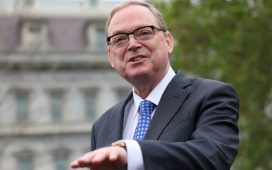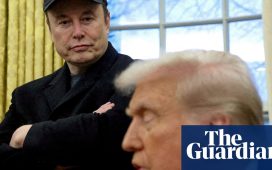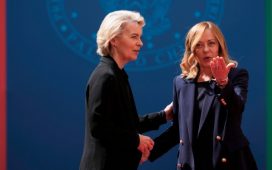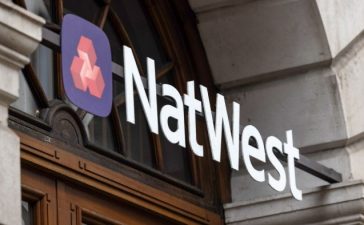Donald Trump early on Thursday condemned the Federal Reserve chair, Jerome Powell, for not lowering US interest rates, and expressed a wish for him to be gone from his role.
The US president lambasted Powell as “always too late and wrong” in a post on his Truth Social platform. Trump noted that the European Central Bank (ECB) was poised on Thursday to lower interest rates again, without mentioning that the body has been responding to the chaos caused by Trump’s initiatives on tariffs.
Addressing reporters later in the day, Trump claimed Powell would resign if he asked him to. Powell himself has said that he would not resign if asked to do so by the president.
Trump has been pressuring Powell to cut US interest rates for months, even though the central bank is independent of the administration in setting monetary policy and the White House typically does not publicly lobby the Federal Reserve.
The ECB had been expected to cut interest rates for the seventh time this year in order to prop up economic growth, and then did so not long before US markets were due to open. Powell enraged Trump on Wednesday night by warning that the president’s sweeping tariffs could raise inflation. That would make the Fed even more hesitant to cut interest rates.
Christine Lagarde, the ECB president, in explaining the reasons why it has – unlike the Fed – cut interest rates, said “the economic outlook is clouded by exceptional uncertainty” because of Trump’s tariffs, which constitute a negative demand shock.
Lagarde was speaking after cutting the ECB’s main deposit rate by 25 basis points to 2.25%.
Europe had been preparing another interest rate cut following the global financial turmoil caused by Trump’s tariffs push, in which he has gone back and forth on whether, when and how deeply to tax imports from other countries, and on which countries, since he returned to the White House for a second term.
He retreated sharply earlier this month from his decision to impose tariffs worldwide, pausing most of the charges for 90 days, although most notably not on China, after markets plunged and US government bonds – traditionally seen as one of the world’s safest financial assets – had suffered a dramatic sell-off. Wall Street chiefs and other experts also forecast a heightened likelihood of recession. Economists polled by Reuters on Thursday put US recession odds at 45%.
After insisting for days that he would hold firm on his aggressive trade strategy, unveiled in full on 2 April, which he dubbed “liberation day”, Trump announced on 9 April that all countries that had not retaliated against US tariffs would receive a reprieve – and only face a blanket US tariff of 10% – until July.
Powell on Wednesday said the US economy was well-positioned but added that Trump’s tariffs were likely to cause “at least a temporary rise in inflation. The inflationary effects could also be more persistent.”
He indicated that the prospect of sweeping tariffs on virtually every trade partner could put the Fed in the unenviable position of having to choose between tackling inflation and unemployment.
The World Trade Organization, meanwhile, warned that Trump’s tariffs would send international trade into reverse this year, depressing global economic growth.
The International Monetary Fund (IMF) managing director, Kristalina Georgieva, said the global outlook was also weakening in the face of the Trump tariff onslaught, adding central banks like the Federal Reserve needed to remain agile and credible.
“Resilience is being tested again – by the reboot of the global trading system,” she said.
Trump also said as part of his Truth Social post at daybreak on Thursday that “Powell’s termination cannot come fast enough”. He dubbed him, further in the post, “Too Late” and put forward the argument that prices were coming down, from oil to eggs.
Trump nominated Powell to become Fed chair during his first term in the White House, in 2018, and Joe Biden renominated him during his term in the White House, in 2022. The US Senate confirms the chair and the US president cannot terminate the head of the Federal Reserve before the end of their four-year fixed stints. Powell is in place until next spring.
The US central bank has held interest rates steady at 4.25% to 4.5% since the start of this year.
Trump said in his post: “The ECB is expected to cut interest rates for the 7th time, and yet, “Too Late” Jerome Powell of the Fed, who is always TOO LATE AND WRONG, yesterday issued a report which was another, and typical, complete “mess!” Oil prices are down, groceries (even eggs!) are down, and the USA is getting RICH ON TARIFFS. Too Late should have lowered Interest Rates, like the ECB, long ago, but he should certainly lower them now. Powell’s termination cannot come fast enough!”
The New York Fed president, John Williams, spoke to Fox Business on TV on Thursday and backed up Powell’s wariness on rates.
“I don’t see any need to change the setting of the Fed funds rate any time soon … It’s really about collecting information, understanding better what’s happening in the economy during the rest of this year, understanding kind of how the uncertainty plays out,” Williams said.
Meanwhile, Politico, citing unnamed sources, reported after Trump’s post that the treasury secretary, Scott Bessent, had been cautioning White House officials against any attempt to fire Powell, for which there is no tested mechanism, saying it would risk destabilizing financial markets.
And there was a fresh alarm bell sounded on the risk of stagflation, in which high inflation combines with high unemployment amid stagnant economic growth.
“A sudden crystallization of the threat to Fed independence would both intensify market stress and shift it in more of a stagflationary direction with a sharp increase in tail risk,” Krishna Guha, vice-chair of an arm of the financial advisory firm Evercore ISI, said in a note.
Reuters contributed reporting







